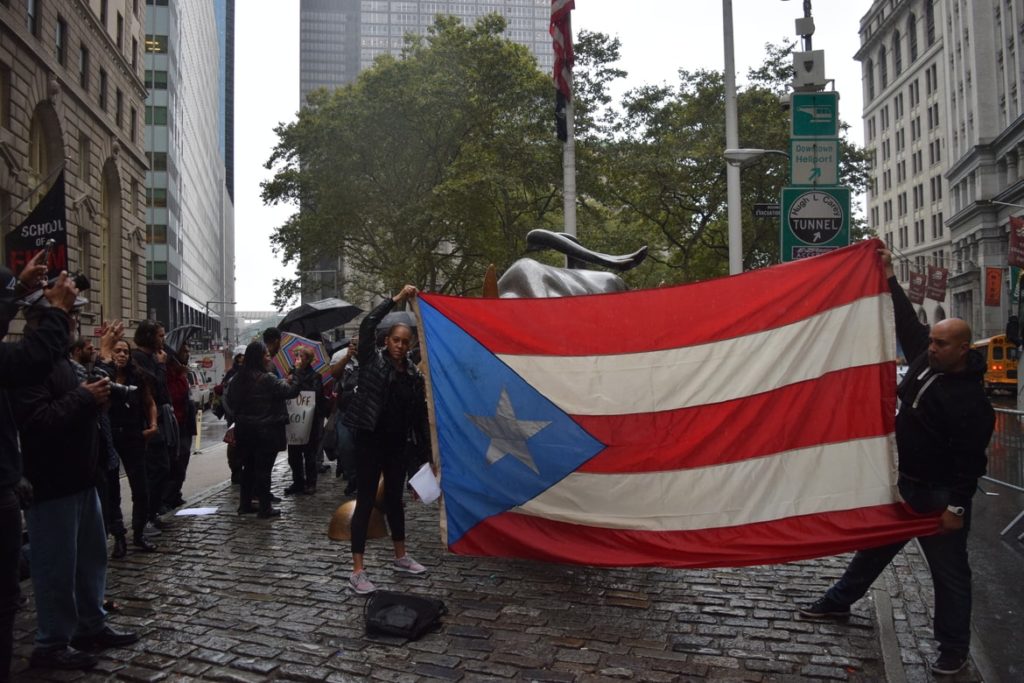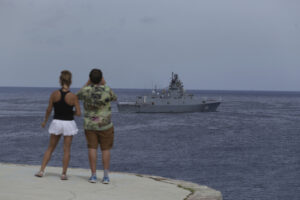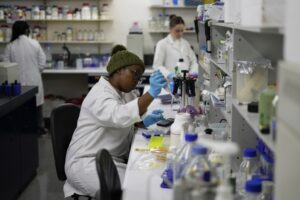At the United Nations and at Home, a Push to Recognize Puerto Rico’s Right to Self-determination

Taken by the author at “Unidos against PROMESA,” a protest that took place on the day that the federally appointed fiscal board was scheduled to meet in New York City (Sept. 30, 2016) | Photo courtesy Lucia Seda
NEW YORK — The question of Puerto Rico’s right to self-determination did not make the agenda of the UN General Assembly in September of this year. Yet, the destruction wreaked by Hurricane María—the worst storm to hit Puerto Rico in 89 years—coupled with the economic crisis that has left the island mired in a $73 billion debt have made the situation impossible to ignore. This is why Olga Sanabria Dávila, a Puerto Rican attorney who has vouched for Puerto Rico for the past 37 years, and Wilma Reverón Collazo, a civil rights attorney and expert on decolonization, will continue to bring the case of Puerto Rico before the United Nations.
“Colonialism develops a relationship of power, of the colonizer having an overwhelming power over the colonized,” said Sanabria, who is the president of the Committee for Puerto Rico at the UN. “In order for that legitimate process of decolonization to take place, the process has to be defined in such a way that this unequal relationship of power is somehow addressed.”
An unincorporated territory of the United States, Puerto Rico does not have an official seat at the United Nations. It is listed as a non-UN member Small Island Developing State, alongside independent nations like the Dominican Republic and Cuba. Previously, it was considered a “Non-Self-Governing Territory” until Resolution 748 removed it from the list following the proclamation of the Commonwealth of Puerto Rico in 1952. Today, Puerto Rico still holds this status and its 3.4 million residents cannot vote in the presidential elections unless they live in the US mainland.
For many years, Sanabria and Reverón have brought the case of Puerto Rico before the Special Committee on Decolonization, which the General Assembly created in 1961 to ensure the implementation of the Declaration on the Granting of Independence to Colonial Countries and Peoples. Resolution 1514, as it is formally known, states that that “all peoples have the right to self-determination; by virtue of that right they freely determine their political status and freely pursue their economic, social and cultural development.” It was signed by the General Assembly in 1960 and no votes were cast against it. Only nine countries abstained from voting, including the United States. Sanabria argues that the United Nations must reiterate the applicability of Resolution 1514, which she calls “the ‘Carta Magna’ of decolonization,” to Puerto Rico.
A self-described “independence advocate,” Sanabria has been involved with the Committee for Puerto Rico at the UN since its inception in 1980. In addition to lobbying delegations in the Special Committee for Decolonization, the PR Committee works with the presentation of the case of Puerto Rico at the yearly hearings of the Special Committee.
“Our work at the United Nations is basically oriented toward the application of international law to the case of Puerto Rico,” she said.
The Special Committee last heard the case of Puerto Rico on June 17. After listening to the testimonies of many Puerto Rican leaders, among them the former political prisoner Oscar López Rivera, the Committee approved a draft resolution—which Sanabria and Reverón partially wrote—without a vote. The document “calls again upon the Government of the United States of America to assume its responsibility to expedite a process that will allow the Puerto Rican people to fully exercise their inalienable right to self-determination and independence.”
The passing of Hurricane María on Sept. 20 only added to the list of Puerto Rico’s increasing woes. It caused widespread structural damage, left the entire island without electricity and threatened the collapse of the Guajataca dam in the northwestern part of the island. Nearly 13 weeks after the storm hit, over a quarter of the population is still without electricity and the number of deaths remains at 64, although the New York Times puts the death toll at 1,052.
Back in September, Jenniffer González, Puerto Rico’s nonvoting representative in Congress, said that the destruction “has set us back nearly 20 to 30 years.”
All of this comes after Congress approved PROMESA, (acronym for the Puerto Rico Oversight, Management, and Economic Stability Act), a bipartisan bill signed into law by President Barack Obama in June of last year. Among other provisions, the bill called for the creation of a seven-member, federally appointed oversight board tasked with restructuring Puerto Rico’s debt and providing “a method for a covered territory to achieve fiscal responsibility and access to the capital markets.” Puerto Ricans in the mainland and abroad see this law as a punitive measure that has not only conferred executive powers to non-elected individuals who have complete control over the budget, but also imposed harsh austerity measures that have further depressed the Puerto Rican economy.
“Our democratic rights have been squandered in the most insensible and anti-democratic manner,” said Reverón, who has worked with the Committee for Puerto Rico since 1980 and referred to the oversight board as a “dictatorship.”
Yet, in Puerto Rico, the push for alternatives to the current political status is gaining momentum. Five years ago, Francisco Jordán, a retired university professor, and his colleagues called a meeting to take the case of Puerto Rican sovereignty beyond the electoral process to which it had been relegated for the past 30 years. The meeting concluded with the establishment of Estado Nacional Soberano de Boriken, a citizen-led, sovereign government parallel to what their members call the “colonial” government in Puerto Rico.
“The purpose of the state is diverse: on the one hand, the creation of a political body—not a partisan one, but rather a political conception of the Puerto Rican nation—that could represent this nation and fight for the right that we have to exercise the sovereignty that the United States has taken from us,” said Jordán in Spanish. The Estado Nacional aims to implement a model of governance that could eventually allow Puerto Rico to break from the cycle of dependence on the United States and emerge as the sovereign nation of Borinken, an allusion to the island’s pre-colonial, Taíno name.
“What we have done is thrown the idea that through a parallel government, insofar as that government is successful in earning the trust of the people and convincing them that things can be done differently, we can change the situation in Puerto Rico,” Jordán added. In November of last year, the Estado Nacional declared a boycott of the 2016 gubernatorial elections and urged elected officials to step down from their posts for being “accomplices of the fraud, of this travesty” that is the “commonwealth” of Puerto Rico.
Despite these efforts, Puerto Rico’s political future remains uncertain. On June 11, the pro-statehood New Progressive Party held a non-binding plebiscite to determine the island’s political status. Although 97 percent of participants voted in favor of statehood only 23 percent of eligible voters went to the polls, a historically low turnout that was partly the result of the pro-status-quo Popular Democratic Party’s invitation to boycott it. As with previous plebiscites, the United States is under no obligation to honor it.
Still, Sanabria and Reverón will continue to champion for Puerto Rico at the United Nations. Last October, Reverón attended a meeting of the Special Political and Decolonization Committee, also known as the Fourth Committee. The case of Puerto Rico was not under consideration, but Reverón mentioned that several countries brought up the “humanitarian crisis” that is unfolding in the island as a result of Hurricane María.
“The final goal, the final objective is to continue to put pressure on the General Assembly of the United Nations to retake the case of Puerto Rico, which they abandoned in 1953 with Resolution 748,” said Reverón in Spanish.
Sanabria pointed out that the year 2020 will mark the 75th anniversary of the founding of the United Nations. She expects that the commemorative events will highlight the achievements of the UN in the process of decolonization of now sovereign, UN-member states.
“What we will have to be doing is intensifying the presentation of the case of Puerto Rico because despite the 75 years of the United Nations, and despite its role in decolonization, Puerto Rico continues to be a colony,” she said.
Lucía Seda is a Master’s Student in Global Journalism and French Studies at New York University. A graduate of Brown University, she worked as an English and Creative Writing teacher at a public high school in Brooklyn for four years. Her work has appeared in Refinery29, Latin America News Dispatch, Civic Ideas and the New York Transatlantic.





